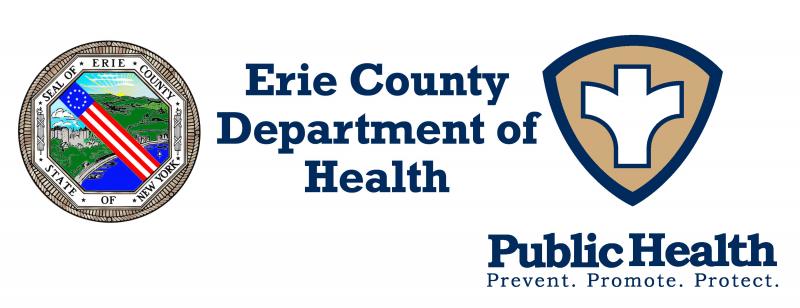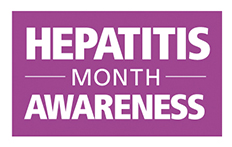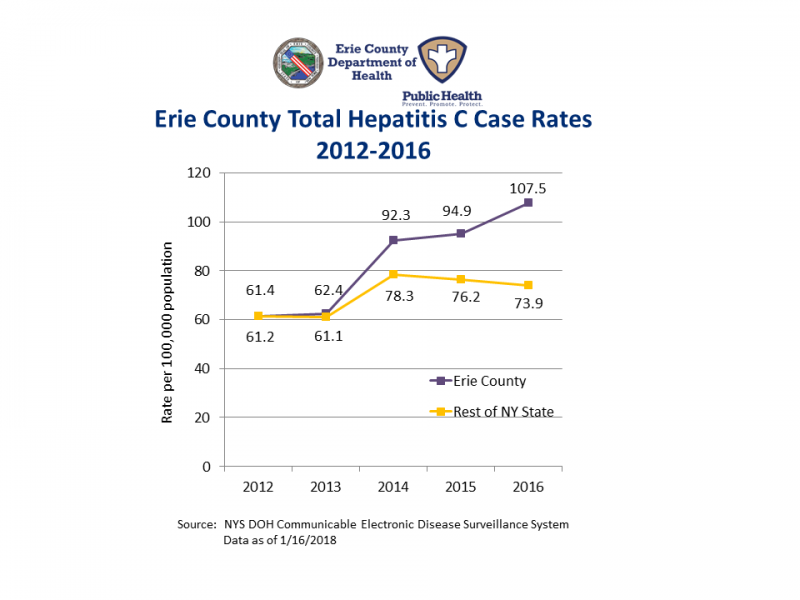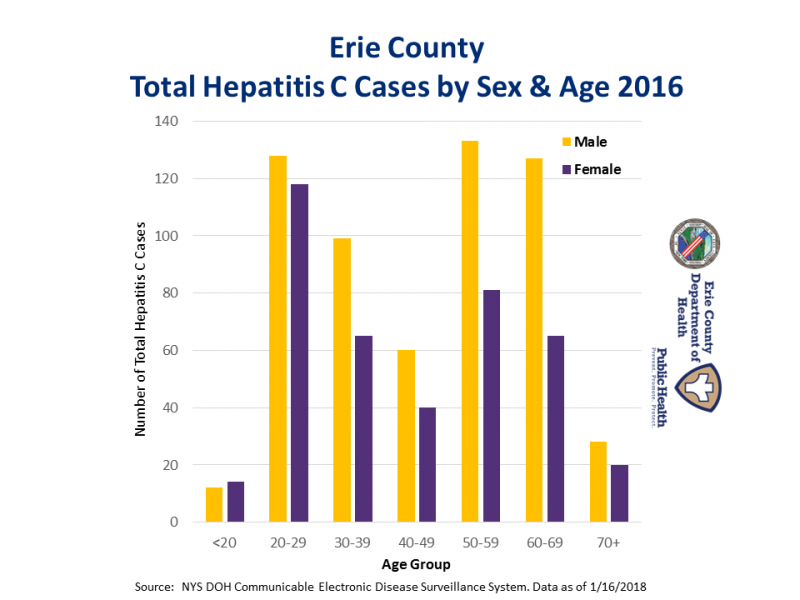Modified: May 18, 2018 2:19pm
Latest News

PRESS RELEASE
From the Office of the Commissioner of Health, Dr. Gale R. Burstein
Date: May 18, 2018
CONTACT: Mary C. St. Mary/Mary.StMary@Erie.Gov
Phone: 716.858.4941/ Mobile: 716.253.3925
Hepatitis C is Largest Infectious Disease Epidemic in the U.S.
Have You Been Tested?
ERIE COUNTY, NY— Hepatitis C virus (“HCV”) cases in the United States and in Erie County have continued to steadily rise between 2010 and 2016—driven by injection drugs associated with the opioid epidemic.
“Hepatitis” means inflammation of the liver. Toxins, certain drugs, some diseases, heavy alcohol use, and bacterial and viral infections can all cause hepatitis. Hepatitis is a blood-borne infection and most people who become infected with the virus develop a chronic infection that causes serious liver disease. Chronic Hepatitis B Virus (“HBV”) and HCV can cause liver damage, cirrhosis, liver cancer and even death.
HCV is a contagious virus that infects the liver and causes liver disease that can result in serious, lifelong illness. HCV is usually spread from exposure to blood from an infected person. HCV is associated with more deaths in the United States than the 60 other Centers for Disease Control and Prevention (“CDC”) reportable infectious diseases combined.
The increase in the number of HCV–related deaths underscores the urgency in identifying and treating patients in the largest infectious disease epidemic in the United States. More than 90% of HCV cases are curable, yet over 18,000 people still died in 2016.
Providing access to clean needles is one of the best ways to prevent the disease’s spread. Erie County Department of Health (“ECDOH”) manages a very active and successful needle exchange program through our Expanded Syringe Access Program (“ESAP”).
“This Saturday, May 19th is National Hepatitis Testing Day in the United States. This is an excellent opportunity to emphasize the importance of testing persons at risk for both hepatitis B virus (“HBV”) and HCV infections. Since approximately 70%–80% of people with acute HCV do not have any symptoms, most of these individuals are unaware of their infection status,” said Dr. Gale Burstein, Commissioner, ECDOH.

Approximately 3.5 million Americans are infected with HCV. Knowing you have HCV can help you make important decisions about your health. Successful treatments can eliminate the virus from the body and prevent further liver damage and prevent transmission to others. 
People born from 1945-1965, or “baby boomers”, are at risk of HCV infection for reasons that are not completely understood. Most baby boomers are believed to have become infected sometime during the 1960s to 1980s when HCV transmission was highest. CDC recommends anyone born between 1945--1965, as well as anyone else at risk (e.g., persons who have ever injected drugs), get tested for HCV.

“While many new cases of HCV are baby boomers born between 1945 and 1965, there are an alarming number of new cases diagnosed in young adults between 20—39 years of age,” stated Burstein. “The rise in HCV coincides with the increase in opioid intravenous drug use. Currently, the most common method of HCV transmission in the United States is by injection drug use. Sharing of needles, syringes or any other equipment to inject drugs are common modes of transmission of blood-borne viruses like HCV.”
There is no vaccine for HCV, but there are treatments that can cure HCV infection. Because persons infected with HCV are often asymptomatic for many years, most have never been tested or diagnosed. The only way to know you are infected is with a blood test. CDC and ECDOH encourage residents to talk to their healthcare provider about HCV testing, especially for individuals born between 1945 and 1965 or those who have ever injected drugs.
HCV Testing is available Monday-Friday at the ECDOH Sexually Transmitted Disease (“STD”) Clinic, located at the Jesse Nash Health Center, 608 William Street, Buffalo.
For additional information, contact the Clinic at (716) 858-7687.
# # #
For More Information:
Erie County Department of Health-ESAP
CDC video: “Hepatitis C: Did You Know?”
CDC Fact Sheet: Why Baby Boomers Should Get Tested
CDC: Interactive Hepatitis Risk Assessment

